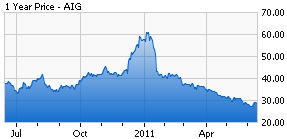- Font Size:
- Print
AIG… Patient Investor
 I have been observing AIG (AIG) for over two decades as a customer, broker, and investor. One sees many arguments for investing in AIG and many arguments for shorting or ignoring AIG as an investment. Both sides have their issues and good points. The major factor contributing to the downfall of AIG was AIG's Financial Products division, located in the United Kingdom, which did not have a comprehension or understanding of the risks they were taking in mortgage markets, thus forcing AIG to obtain financial assistance from the U.S. Government which now owns approximately 77%. Consider the issues against investing in AIG, and the positive facts for investing in AIG.
I have been observing AIG (AIG) for over two decades as a customer, broker, and investor. One sees many arguments for investing in AIG and many arguments for shorting or ignoring AIG as an investment. Both sides have their issues and good points. The major factor contributing to the downfall of AIG was AIG's Financial Products division, located in the United Kingdom, which did not have a comprehension or understanding of the risks they were taking in mortgage markets, thus forcing AIG to obtain financial assistance from the U.S. Government which now owns approximately 77%. Consider the issues against investing in AIG, and the positive facts for investing in AIG.AIG the poor investment…
- The overhang of the U.S. Government owning 77% of the company can be deemed a negative factor by some. Many investors feel that with the government selling so many shares, it will not support the price of the stock and cause further dilution of ownership.
- AIG has been adding additional bulk reserves as a result of poor long-term loss estimates in asbestos, excess casualty, primary workers' compensation, and excess workers' compensation.
- Many investors, including Hank Greenberg, the former Chairman, feel that the company has sold many of its great businesses.
- The recent earthquake/tsunami in Japan, the New Zealand earthquake as well as the floods of Australia resulted in a $1.7 billion reserve loss.
AIG the great long-term investment…
- AIG has great worldwide brand recognition.
- Its products are innovative and highly creative.
- Chartis has realigned itself in order to reduce its business lines in less profitable areas and increase its writings in more profitable lines. One example of this is the worker's compensation writings have been greatly reduced.
- AIG has increased their bulk reserves the last two years. Typically, insurance companies are very conservative reserving in a hard insurance market (hiding profits) and reserving lightly in a soft market (showing more profit). AIG has seriously addressed this issue and even established a recent contract with Berkshire Hathaway (BRK.A) for the asbestos reserves reinsuring this exposure for a premium of $1.65 billion with a limit of $3.5 billion. AIG had tackled this issue even in a prolonged soft market. The reserving process is really a very educated guess that involves the use of algorithms, past historical data, changes in court decisions, and changes in insurance policy forms. There have been accusations that AIG did not reserve enough over the past years; however, the critics have no data to support this theory with the exception of the reserve increases the past two years.
- There has been vast improvement in AIG's earnings potential. When examining the first quarter of 2010, the after tax operating earnings per share was stated at $.95, and checking the first quarter of 2011, it improved to $1.30 (.pdf) per share. There was significant improvement even with all the charges, including, but not limited to the $3.3 billion charge for prepayment of the FRBNY loan and various costs of selling entities and downsizing the company. Even in AIG Financial Products, they have reduced their trades from 44,000 to 3,900, thus reducing the volatility in their profits.
- AIG has substantial deferred tax assets that can offset future tax obligations. In fact, the management installed a poison pill with warrants that should be preventing anyone from buying more than five% of AIG. The purchase of shares exceeding five% could trigger IRS rules that would eliminate or reduce these tax credits.
- The expense ratio for Chartis in the first quarter was 31.1% (.pdf) the prior year, and is currently 29.3%. This is a 1.8% reduction.
- ILFC continues to purchase aircraft from Boeing (BA) and Airbus for their leasing operations. The new aircraft require less fuel and maintenance. This is a real plus if the airlines are focusing on reducing future costs and attracting new customers for air travel.
- Bruce Berkowitz, Chairman of Fairholme Capital Management, is known for his long-term investing abilities. He made a considerable investment in AIG and it is one of his top ten holdings.
- BlackRock Financial Management, Inc. purchased 1,779,500 shares of stock as of March, 2011. BlackRock's original holding was slightly over 394,000 shares as of December 31, 2010.
I believe, at this point, that most of the bad news - increased reserving and major changes - is history. Earnings in the future will be more predictable and stable; this gives the agile AIG more flexibility in designing its future for customer commitment, employees, and shareholders. I am not saying there is no risk when investing in AIG, however, this is not the same company and should be reevaluated by all investors whether you are an institutional buyer, a hedge fund, a mutual fund, or the all-important individual investor.
Disclosure: I am long AIG.
This article is tagged with: Long & Short Ideas, Long Ideas, Financial, Property & Casualty Insurance, United States